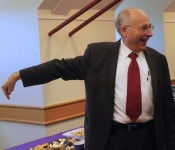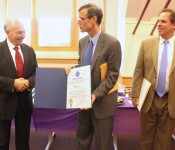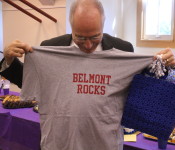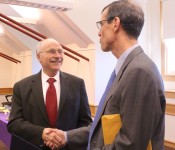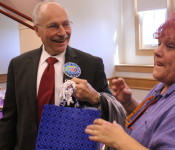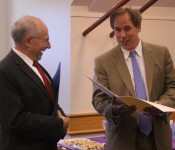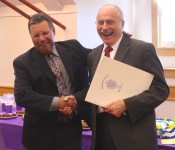Dr. Thomas Kingston’s final day in charge of the Belmont School District was a leisurely one.
Wearing a seasonal pink Polo shirt at the School Department’s Administration Building on Pleasant Street, Kingston had completed the bulk of “clearing out my desk” on Sunday when he could have a day of “quiet resolve.” So by Monday, June 30, the Arlington resident had little left to do but for a few minor tasks as well as writing a note to his successor, Milton’s Assistant Superintendent John Phelan, which he left on the desk in his now empty office.
After three years of what many residents considered a highly successful tenure at the head of a highly-regarded school district, the former head of the Chelsea Public Schools, who accepted what was to be a one-year appointment in June 2011 will turn to coaching new superintendents for the state’s superintendents association.
Before he departed in the early afternoon, Kingston granted the Belmontonian a few last minutes to ask about his time leading the district and some final thoughts.
Belmontonian: What surprised you of the community?
Kingston: What surprised me initially was that Belmont was so economically conservative for such a high performance district. The investments to the schools were very carefully monitored, successfully so. I don’t consider that a negative.
Q: In the past decade, Belmont schools have seen an ever increasing influx of children of immigrants or those whose native language is not English. Will this be an important change to education in Belmont?
A: I don’t think it’s going to be important. I think it is since it’s already here. I read where 15 percent of the Massachusetts population is foreign born and 14 percent in the US, which is the highest rate of immigration in the hemisphere or perhaps worldwide. We are an immigrant nation.
So in terms of our educational enterprises we have to be more sophisticated on how to work with second language learners and children who come from varying cultures.
The first key is to acknowledge this shift in demographics and the increasing international population. That requires teachers to be that much more intent to their ability to work with second-language students and understand how learning a second language occurs. That’s why Belmont is putting our teachers through sheltered English immersion training because we are assuming that at some point soon in their careers, they will be a teacher of just those students.
And remember, this change in population enriches the opportunities and certainly enriches the stature of the district to have an international reputation. It’s an achievement.
Q: For the past year, you have called for an operational override to allow Belmont to “continue providing the best education to … students.” if passed, how should the town and schools use the new revenue?
A: The use of any additional revenue from an operational override will be dependent on the long-range plans [decided by the town.] You can’t use the funds as a Band-Aid because that is a cliff that you fall right off.
I don’t know the precise amount that is needed; the lesson for Belmont is see how Arlington constructed its long-term override [passing a $6.5 million, multi-year override in June 2011 in an effort to restore core instruction in Arlington schools]. But even then, schools can be hit by a huge influx of student so you could be facing some deficits that you have to close with reserve cash transfers. You can’t allow those to be drained prematurely.
There is a list of priorities for using any additional money starting with hiring another English Language Learner teacher at the Chenery [Middle School] that will help reduce class size there. Then there is the auxiliary support to teachers such as with district aides. But those can only be accomplished with available funds.
There are instructional needs [Kingston has advocated the return of foreign language at the Chenery] for sure but those are add-ons. The priority list is to ensure that you can meet the needs of an increasing student population.
Then you want to restore some of the services that have been defunded over the years, for the social and emotional needs of students by hiring counselors and then restore the instructional opportunities cut in the past such as 5th grade foreign language and fine arts at the High School.
Q: What should parents and residents do to keep Belmont a top-level school system?
A: Parents need to be involved citizens and be aware of the natural tension that there always is between very high property taxes and very high service demands not just coming from the school system. The schools must be linked arm-to-arm and leg-to-leg with the town. We can not be in conflict with town needs and can not be trying to steal the money away from the infrastructural issue that the town faces. Priorities must be made jointly. I’m happy to say that Belmont understands this.
